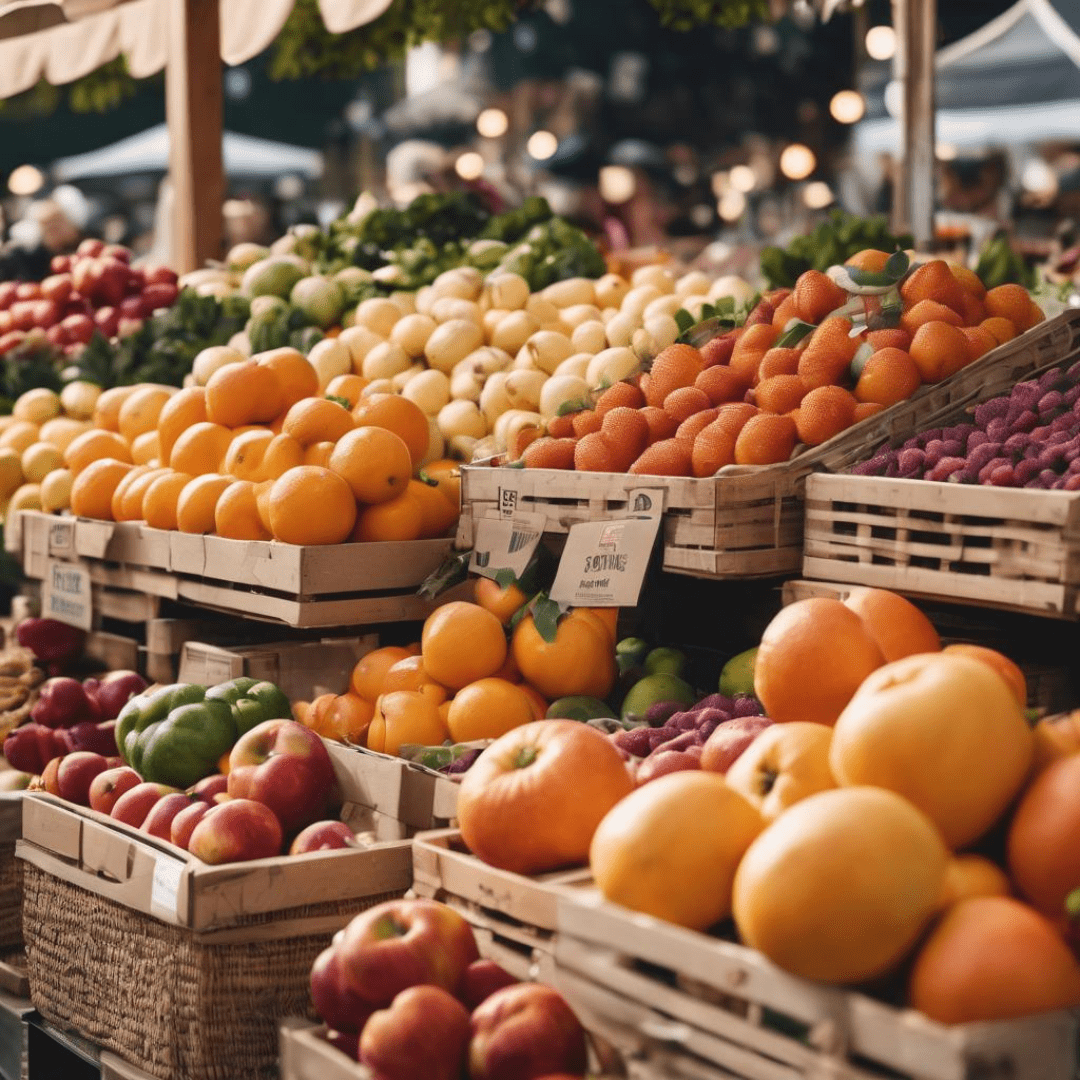Supporting farmer’s markets.
- Introduction to Farmers Markets
- Economic Benefits of Farmers Markets
- Environmental Impact of Supporting Farmers Markets
- Health and Nutrition Benefits of Shopping at Farmers Markets
- Community Building and Social Impact of Farmers Markets
- Supporting Local Agriculture and Preserving Farmland
- Access to Fresh and Local Produce for all Socioeconomic Groups
- Conclusion: Importance of Supporting Farmers Markets
- Frequently Asked Questions
- Summary
Farmers markets have become increasingly popular in recent years as people seek out fresh and locally sourced produce. These vibrant marketplaces provide a unique opportunity for farmers to sell their products directly to consumers, cutting out the middleman and creating a direct connection between the grower and the buyer. In this article, I will explore the various ways in which supporting farmer’s markets makes a difference. From the economic benefits for local communities to the positive environmental impact, health and nutrition advantages, community building, and the preservation of farmland, I will delve into the multifaceted reasons why farmer’s markets are crucial to our society. By understanding how farmer’s markets contribute to a more sustainable and thriving food system, we can make informed choices that support local agriculture and make a positive impact on our communities.
This is a pinnable post. Tap or hover over any image in this post to pin to your Pinterest Boards.

Introduction to Farmers Markets
What are Farmer’s Markets?
Farmers markets are vibrant community gatherings where local farmers, growers, and artisans gather to sell their products directly to consumers. These markets offer a wide variety of fresh produce, meats, dairy products, baked goods, and handmade crafts. It’s a place where shoppers can connect with the people who grow their food and learn more about where their food comes from.
Historical Overview of Farmers Markets
Farmers markets have a rich history that dates back centuries. In ancient civilizations, marketplaces were the center of trade, where farmers and artisans would come together to exchange goods and services. Over time, as industrialization took hold, agriculture became more commercialized, and the connection between farmers and consumers was lost.
However, in recent years, there has been a resurgence of interest in supporting local agriculture and reconnecting with the source of our food. Farmers markets have become a popular avenue for consumers to access fresh, local products while supporting small-scale farmers and producers.
Economic Benefits of Farmers Markets
Job Creation and Local Economy
One of the significant economic benefits of farmer’s markets is the creation of jobs and the stimulation of the local economy. By supporting these markets, you are directly contributing to the livelihoods of farmers, growers, and artisans in your community. They can expand their businesses, hire more employees, and invest in the local economy, strengthening the overall financial health of the region.
Increased Revenue for Local Farmers
Farmers markets provide an essential income source for local farmers. By eliminating middlemen and selling their products directly to consumers, farmers can receive a fair price for their hard work and dedication. This increased revenue enables them to reinvest in their farms, improve their infrastructure, and continue producing high-quality, sustainable food for the community.
Environmental Impact of Supporting Farmers Markets
Reduction in Carbon Footprint
Supporting farmer’s markets can significantly reduce our carbon footprint. Locally sourced food travels shorter distances from farm to market, resulting in reduced transportation emissions. Additionally, small-scale farmers often employ sustainable farming practices that minimize the use of synthetic chemicals and promote biodiversity. By choosing to shop at farmer’s markets, you are supporting these environmentally friendly practices and helping to combat climate change.
Preservation of Biodiversity
Industrial agriculture often prioritizes monoculture, which contributes to the loss of biodiversity. In contrast, farmer’s markets offer a wide variety of fruits, vegetables, and animal products, showcasing the incredible diversity of regional agriculture. By purchasing from these markets, you are supporting the preservation of heirloom and local crop varieties, as well as the conservation of indigenous animal breeds. This biodiversity is crucial for maintaining a healthy and resilient food system.
Health and Nutrition Benefits of Shopping at Farmers Markets

Access to Fresh and Nutrient-Dense Produce
Farmers markets are a haven for fresh and nutrient-dense produce. Unlike supermarket produce that often travels long distances and may spend days in storage, the fruits and vegetables at farmer’s markets are typically harvested at the peak of ripeness, ensuring optimal flavor and nutritional content. By incorporating these fresh, seasonal foods into your diet, you can enhance your overall health and well-being.
Increased Consumption of Locally Sourced Foods
Shopping at farmer’s markets encourages a greater consumption of locally sourced foods. These products are often grown using sustainable practices, free from synthetic pesticides and genetically modified organisms (GMOs). By supporting local farmers, you not only prioritize your own health, but also ensure that your food dollars stay within the community, fostering a more resilient and self-reliant food system.
Supporting farmer’s markets is a win-win situation. You get access to fresh, delicious food while making a positive impact on the local economy, the environment, and your own health. So, grab your tote bag and head to the nearest farmers market—it’s time to support the hardworking farmers and artisans who make it all possible!
Community Building and Social Impact of Farmers Markets

Fostering Connections Between Farmers and Consumers
Farmers markets provide a unique opportunity for consumers to connect with the people who grow their food. Forget the supermarket experience of pushing a cart through aisles, farmers markets allow you to have real conversations with the farmers themselves. You can ask questions about their farming practices, get tips on how to cook with their produce, or simply bond over a shared love for fresh, delicious food. These interactions create a sense of community and build trust between farmers and consumers, fostering a stronger local food system.
Promoting Cultural Diversity and Inclusivity
Farmers markets are vibrant spaces where diverse cultures come together. You’ll find an array of produce, not just the standard supermarket fare, reflecting the unique flavors and culinary traditions of the local community. From heirloom tomatoes to alluring spices, farmer’s markets celebrate the richness of cultural diversity. By embracing these diverse offerings, farmer’s markets provide a platform for inclusivity, allowing everyone to feel seen and heard, regardless of their background. Where else can you find samosas and empanadas alongside freshly baked bread and organic kale?
Supporting Local Agriculture and Preserving Farmland
Encouraging Sustainable Farming Practices
When you shop at farmer’s markets, you support local farmers who prioritize sustainable farming practices. Unlike large-scale industrial agriculture, these farmers take care of the land, using methods that promote biodiversity, reduce chemical usage, and prioritize soil health. By choosing to buy from them, you contribute to the demand for sustainable farming, sending a clear message that you value environmentally friendly food production. Plus, you get to enjoy produce that’s bursting with flavor, thanks to the care and attention these farmers put into their crops.
Mitigating the Threat of Urbanization on Farmlands
As cities expand and urban areas encroach upon farmland, supporting farmer’s markets becomes crucial in preserving agricultural land. By providing a direct market for farmers to sell their produce locally, farmer’s markets help sustain their businesses and prevent the loss of valuable agricultural land to urban development. When you choose to buy from farmer’s markets, you play a role in safeguarding farmlands from disappearing under concrete and skyscrapers.
Access to Fresh and Local Produce for all Socioeconomic Groups
Addressing Food Insecurity and Food Deserts
Farmers markets play a vital role in addressing food insecurity and combating food deserts, which are areas with limited access to fresh and affordable food. By bringing fresh produce directly to communities, farmer’s markets ensure that everyone, regardless of income, can access nutritious food. Many farmer’s markets also participate in government programs like SNAP (Supplemental Nutrition Assistance Program), making healthy food even more accessible to low-income individuals and families. Supporting farmer’s markets means supporting food equity and helping to bridge the gap in access to fresh, nutritious meals.
Visit the National Local Food Directories to find a local farmer’s market in your area!
National Local Food Directories
Making Healthy Food Affordable and Accessible
Contrary to the misconception that farmer’s markets are only for the elite, they actually offer great value for your money. By eliminating middlemen and the need for long-distance transportation, farmer’s markets cut out unnecessary costs. As a result, you often find that the produce at farmer’s markets is competitively priced or even cheaper than what you would find at a supermarket, especially considering the superior quality and freshness. Supporting farmer’s markets not only supports local agriculture, but also makes healthy, high-quality food more affordable and accessible for everyone.
Conclusion: Importance of Supporting Farmers Markets
In conclusion, farmer’s markets are not just charming weekend destinations for foodies; they play a crucial role in building strong communities, preserving farmland, and ensuring access to fresh, local produce for all. By supporting farmer’s markets, you contribute to the sustainability of local agriculture, promote cultural diversity, address food insecurity, and make healthy food more affordable. So, go ahead and visit your local farmers market. It’s a win-win – you’ll make a difference while enjoying the bounty of the season!
Supporting farmer’s markets is not just about buying fresh and delicious produce; it is about investing in our local communities, environment, and our own well-being. By choosing to shop at farmer’s markets, we contribute to the economic growth of our neighborhoods, support sustainable farming practices, and foster a sense of community and connection. Moreover, we prioritize our health by gaining access to nutrient-dense foods while actively reducing our carbon footprint. Farmers markets play a vital role in preserving farmland and ensuring that future generations will have access to locally sourced, fresh produce. So let us continue to support farmer’s markets, making a difference one purchase at a time.

Frequently Asked Questions
1. Why should I shop at farmer’s markets instead of supermarkets?
At farmer’s markets, you can find fruits, vegetables, and other products that are grown or produced nearby, often harvested just hours before being sold. This ensures the highest level of freshness and flavor compared to produce that travels long distances to reach supermarkets. By purchasing directly from local farmers, you are supporting their livelihoods and contributing to the economic growth of your community. It helps farmers receive fair prices for their products and encourages job creation in the agricultural sector.
2. Are prices at farmer’s markets higher compared to supermarkets?
While it is true that some products at farmer’s markets may have slightly higher prices compared to supermarkets, this is not always the case. Prices can vary depending on factors such as location, seasonality, and the specific product. Additionally, farmer’s markets often provide an opportunity to negotiate prices directly with farmers, making it possible to find good deals. When you buy from farmer’s markets, you are not just paying for the produce itself. You are also supporting sustainable farming practices, reducing environmental impact, and investing in the overall health and well-being of your community. Therefore, the value gained from shopping at farmer’s markets extends beyond the price tag.
3. How can I find farmer’s markets in my area?
There are several online directories and websites that can help you find farmer’s markets in your area. Local newspapers, community bulletin boards, and social media groups may also provide valuable information about nearby farmer’s markets. Tourism centers, agricultural extension offices, or local agricultural organizations often have information on farmer’s markets in the region. They can provide you with maps, schedules, and details about the vendors and products available at each market.
Summary
I hope I have inspired you to check into supporting farmer’s markets with these helpful tips and products. Here are some other links you may be interested in reading!
How to Have an Eco-Friendly Christmas
How to Winterize Your Home: Prepare for Jack Frost’s Wrath!
Proven Hacks to Make Your Christmas Tree Survive
What Thanksgiving Teaches Us About Survival
Homeless Survival Hacks to Overcome Adversity
Is Your Car Ready for Winter? The Ultimate Checklist for Your Winter Emergency Car Kit
What The Walking Dead Can Teach Us About Survival: The Walking Dead Survival Tactics
Get Lockdown Ready: Best Dollar Tree Survival Items
Understanding Water Purification Methods for Survival: Best Practices Explained
Thirsty for Survival: Expert Guide to Emergency Water Prep Tactics
The Benefits of Urban Homesteading: Revolutionize Your City Life
Practical Pantry Prepper: Essential Guide
How to Grocery Shop Once a Month
What Should Be in A 72-Hour Survival Kit?
Buy or Die: Prepper Items You Need Now
How to Learn 58 Self-Sufficient Skills Right Now
Road to Self-Sufficiency: How to Start Your Journey
If you were encouraged by this post, I invite you to check out my FREE Printables Page for fun free printables, planners, and charts.
ENTER MY FREE Printables Page HERE
Blessings,
The Off Grid Barefoot Girl





